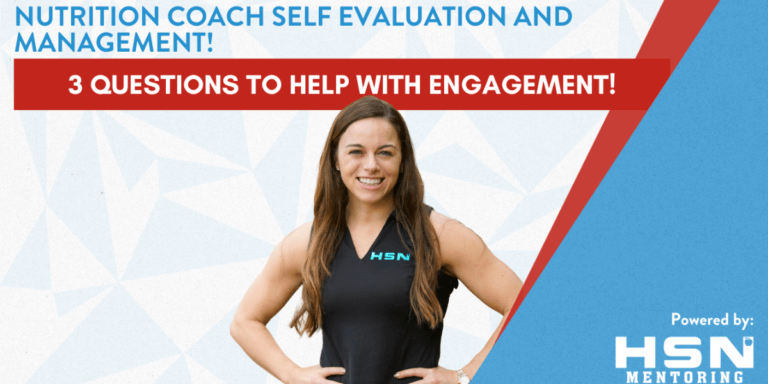Self evaluation and management is one of the most valuable skills you can have as a nutrition coach. Not only will this help you grow as a coach, but it will help you maintain a client centered nutrition coaching program.
We know the answers to our clients questions, and we know what they need to do in order to reach their goals. This being said, simply telling them what to do doesn’t work. If it did, we wouldn’t have clients as Google, the information super highway has answers to almost any question a nutrition client could ask.
By losing the ego and evaluating your own performance, your skill set will increase, and you will identify areas where you can get better. Ultimately this will lead to professional growth and more engagement from your clients.
In this blog post we will list 3 questions to ask yourself as a nutrition coach to help you evaluate your approach when working with clients.

What Is Self Evaluation And Management As A Nutrition Coach?
Self-evaluation involves taking an honest and critical look at your own strengths and weaknesses as a coach. This can involve reflecting on your level of knowledge, your communication skills, your ability to motivate and support clients, and your overall approach to coaching.
Once you have identified areas in which you can improve, you can develop a plan for self-improvement. This might involve taking additional courses or training, seeking out feedback from colleagues or clients, or simply making a concerted effort to be more mindful of your interactions with clients and their progress.
Our HSN Mentoring nutrition coaches have a ton of continuing education resources we provide them on a weekly basis in order to help improve communication and approach to coaching. In the event that you are not an HSN Mentoring client or coach, checking out our free help is a great place to start!
If you are considering a nutrition coaching program, click the button below to book a free call so we can help you find the right certification!

Why Is Self Evaluation Important As A Nutrition Coach?
Self-evaluation and management are important for nutrition coaches for several reasons:
Ensure client success
As a nutrition coach, your ultimate goal is to help your clients achieve their health and wellness goals. By engaging in regular self-evaluation, you can identify areas in which you can improve as a coach, and make changes that will help you better support your clients and improve their chances of success.
Maintain professionalism
Nutrition coaching is a rapidly-evolving field, and it is important for coaches to stay up-to-date with the latest research and trends. Regular self-evaluation can help you identify gaps in your knowledge and skills, and take steps to fill those gaps, ensuring that you are providing your clients with the most accurate and up-to-date information.
Prevent burnout
Nutrition coaching can be a demanding and high-pressure profession, and it is important for coaches to take steps to maintain their own physical and emotional health. Self-management techniques such as stress management, exercise, and self-care can help coaches avoid burnout and maintain their energy and enthusiasm for their work.
Build trust with clients
By demonstrating a commitment to self-evaluation and self-improvement, nutrition coaches can build trust with their clients, showing that they are dedicated to providing the best possible guidance and support.
Overall, self-evaluation and management are critical skills for nutrition coaches, helping them to maintain their own health and wellness while providing effective, evidence-based guidance to their clients.

3 Questions To Ask Yourself As A Nutrition Coach
You, as a nutrition coach, are in service of your client. Being intentional with how you guide the conversation with your them, and what you ask them in extremely important.
Evaluating that what you are going to say to your client elicits their best thinking is how to become an effective nutrition coach. Anybody can be a information access point, however becoming a thought provoking mentor takes some practice and self evaluation.

Question #1 - Is This Conversation Or Question Providing Value?
Sometimes the conversation you have with your clients goes so far away from what they are wanting in the moment. Often times this comes into play with clients we have had for quite a long time. We are familiar with their lives and what is going on personally with them so we get stuck on the easy stuff like getting filled in on their kitchen reno or their kid going to college. In that conversation, how much progress they have made since their last check in and the main topic of the checkin gets lost.

Question #2 - Is This Conversation Or Question Helping My Client Get To Their Best Thinking?
If a client asks us a question and we give them three different options that help them without getting their input, then we as a coach are not eliciting a system that allows our clients to think for themselves.
Many times our clients may have a thought or option come to mind that may be perfect for them, but as a coach we don’t hear it because we don’t ask for it. Providing our clients an opportunity to think further than they are currently thinking is our main goal.
This is a completely different type of coaching than most of us think we are “supposed” to be providing. Many nutrition coaches are trained to listen to their clients problems and then provide examples of exactly what to do. But learning to ask thought provoking questions to help your clients come up with their own potential solution can speak volumes to their success.
It’s a delicate balance, and never providing solutions is not what we are suggesting, however providing the space your client feels safe to explore some of their own ideas based off of your guidance may help them find a more probable solution that what you may have told them to do.

Question #3 - Is This Conversation Or Question Benefiting My Curiosity Or Is It Benefiting My Client?
We are naturally curious as humans and we want to see a bigger picture. Not getting stuck on things that may be interesting to you but not helpful in moving them forward towards their future goals is a waste of their time. This can come into play with anything related to their lifestyle or an experience they may have with a product or service not related to the reason they are seeing you. Focus on the topics that are important!
Although some of these conversations may help build report, getting stuck on them and not addressing the real issues is easy to do. Self awareness comes into play here.
Examples Of Thought Provoking Questions

Example #1 - If the holidays or summer hits and your client comes to their session saying "I don't think I can focus on anything right now, I want to take a break from coaching."
Ask prompting questions like:
With everything you are bringing in, what is standing out as important?
I’m wondering if we can take a deeper dive into what aspects of your life are leading you to this feeling.
On a scale 1-10, how important is X goal to you right now?
(3-part question) Imagine yourself 6 months from now continuing to focus on what is manageable right now. Where did you see yourself? Now, imagine yourself 6 months from now if you were to take a step back from focusing on your goals. How does that future differ from the first? How does that make you feel?

Example #2 - If you and/or your client is focusing only on objective measures when setting goals (I.e. body fat %, weight, clothing size). Or, If your client is using restrictive language and feels frustrated with their journey.
Help your client look beyond surface-level desires and help them to connect with the identity of the person they want to be. As a coach, it is our job to help our clients look beyond surface-level and objective goals to connect with the subjective goals (who they will be and how they will feel after they reach their goal).
Ask prompting questions like:
When you think of who you want to be a year from now, what is coming up for you?
Close your eyes and imagine yourself a year from now when you accomplished all the things you set out to do. Describe to me how you are feeling at that moment.
Ask questions to move forward:
Are your actions aligning with your future successful self (person you want to become)?
With everything you are bringing in, are you seeing what may be important for us to take a closer look at?
What barriers are holding you back from being the person you want to be?
Understanding the identity behind a goal can be used to increase client motivation and compliance. It can be used to shift the mindset from, “I can’t do this…” to “If I do this instead, it aligns with who I am wanting to become”.

Example #3 - If you celebrate milestones and non scale victories by simply saying "awesome job!"
Instead, discuss what they have learned from their success and by establishing the habit. How has it impacted other areas of their life.
Ask questions like this:
Given what you’ve accomplished, What do you see now? What are you learning from yourself?
What do you have now that you didn’t have before?
How will you continue to stay consistent? Are there any potential barriers coming up for you that we can navigate together?

Final Thoughts
Assuming what your client needs is something that happens quite often in a coaching relationship. Rather than assume, allow your client to do a self assessment.
Start off every check in you have with a client by asking them what they want. Self review is important! Find out from the beginning what they are hoping to get out of their visit that day. By providing a place for strong self evaluation you will provide so much more value than just telling them what to do.
You are giving them space to think about what they want and provide feedback to you, rather than you focusing on what you would like to see from them as a coach and then telling them what to do. When you ask some of these problem solving questions, you are prompting your clients to think of something they would have never taken the time to think of on their own.
Your value as a coach comes from your problem solving skills and asking clients questions that will allow them to think and reflect. Personal growth opportunities come from self reflection.
Value as a coach isn’t given by simply providing meal plans and macros. Specific examples of these two things can be found by your clients online on Google. Your clients need more than meal plans and macros to be successful. Your value comes in helping them come up with new ideas that will get them on the right path to keep working towards their goals.




